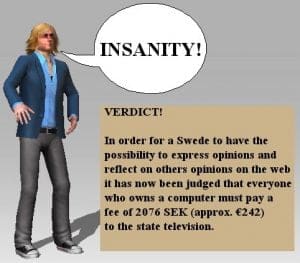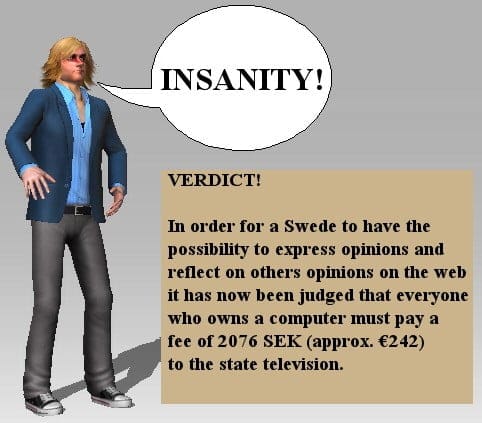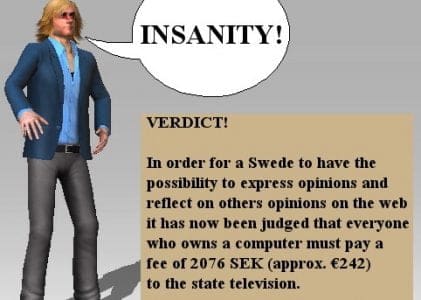 According to the UN Declaration of Human Rights Article 19 all citizens have; ”freedom to
According to the UN Declaration of Human Rights Article 19 all citizens have; ”freedom to ![]() hold opinions without interference and to seek, receive and impart information and ideas through any media and regardless of frontiers.” With the web this basic right has been made possible to use to its fullest extent. At least until now …
hold opinions without interference and to seek, receive and impart information and ideas through any media and regardless of frontiers.” With the web this basic right has been made possible to use to its fullest extent. At least until now …
After verdicts in several cases in the Swedish Court of Law about the extended TV-licence, which now also will include computers, the foundation has changed dramatically. In order for a Swede to have the possibility to express opinions and reflect on others opinions on the web it has now been judged that everybody who owns a computer must pay a fee of 2076 SEK (approx. €242) to the state television. The perspectives swirl, but in this case the main problem rests on an old system that should have been buried at the time of the breakthrough of commercial TV.
The Swedish TV-licence was implemented in 1956. In this age only one state-owned channel existed and nothing more in Sweden. In 1969 the second state-owned channel was launched. In this media-landscape the TV-licence based on ownership of a TV seems like a relevant form of financing the state television. Many years later, in 1987, the state monopoly for TV broadcast was broken. Sweden was second to last in Europe to give the citizens’ access to commercial TV, only Albania was after. This could work as an indication of Swedish states problems of handling media politics.
The fee on TV-ownership remained untouched despite the profound change that now several broadcasting companies existed on the Swedish market. However, to some extent this could be explained by the fact that they all used the same media form. In other words that the user passively receives messages that are broadcasted on fixed times that the TV-channel decides. The web is mainly the opposite of this media-form, while traditional TV is an authoritarian passivating media where the broadcasting company determines the content and the message, the web is an activating democratic media where all users has the possibility to choose content, create their own content, and then spread it freely beyond the national borders.
This profound change of the media landscape is something that Finland has recaptured. From this year the TV-licence-fee has been removed instead YLE (the state television of Finland) is financed directly with a tax. The tax differs depending on the individual’s income, somewhere between €50 to €140 per year (before the TV-licence fee was €200 in Finland), all citizens over 18 years old must pay. In this way all citizens contribute to the financing of the state television according to their own individual income. Furthermore, this construction also solves the Article 19-problem. Since the fee does not directly violate the fundamental freedoms that were proclaimed in the UN Declaration of human rights Article 19, its just a general tax. A corresponding article is also included in the European Convention Article 10:
“Everyone has the right to freedom of expression. This right shall include freedom to hold opinions and to receive and impart information and ideas without interference by public authority and regardless of frontiers. This Article shall not prevent States from requiring the licensing of broadcasting, television or cinema enterprises.”
The last row specifies the possibilities for state intrusion of basic human rights, but the web is owned by nobody or rather everybody, although to get access you need a computer. A fee of 2076 SEK (€242) seems to violate the fundamental principles that a democratic society rests on, or? Hopefully, the model of Finland will lead the way also for Sweden when it comes to financing the state television in the future. But before this hopefully higher Court of Laws will take all laws into consideration when they judge on the cases about the computer-licence-fee. Since the existing verdicts surely will be appealed.
Written by
LarsGöran Boström©
Opens in a new tab



